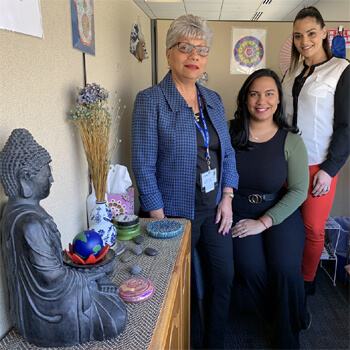CHA partnership with a community college provides careers

Student loan debt in the United States topped $1.5 trillion in 2019.
The ever-increasing cost of secondary education is leading to a crisis as countless people are strapped with debt before they start a family or career.
The average cost of fees plus tuition for the 2019-2020 school year was $11,260 for state residents at public institutions and $27,120 for out-of-state students. The cost of private education was a staggering $41,426. Community college offers an alternative for midlife professionals seeking a career change and other populations who may not have the resources to take on student debt. The average cost of community college is $3,660 per year for in-state students. The option offers students affordably, flexibility and school-life balance on top of savings realized.
Cities across the country, including Boston, Massachusetts, have implemented initiatives to offer low-income people the opportunity to attend Community College for free. As of 2018, more than 200 cities and towns and 16 states have expanded access to community college. The Tuition-Free Community College Plan in Boston pays for three years of community college for eligible Boston residents and can be a true game-changer in people's lives.
The Medical Interpreting Certificate Program at Bunker Hill Community College (BHCC) in Boston prepares qualified bilingual students, via lectures, classroom training, and hospital-based clinical experience, to be medical interpreters in a myriad of health care settings. While the program is not free, it gives people who complete it a cost-affordable avenue to pursue career advancement.
The Cambridge Health Alliance (CHA) Multicultural Affairs & Patient Services department has had a partnership with BHCC since 2014 and offers an internship program for students pursuing a career in medical interpreting. CHA takes its role as an employer of people in its service area seriously. As of 2019, about 35% of its employees come directly from the communities it services which include Cambridge, Somerville, Malden, Chelsea, Revere, Everett and Winthrop. CHA understands that part of improving overall community health and wellness is being a good local employer.
Spanish medical interpreters Ileana Sanchez-Vazquez, Winifer Polanco and Gloria Guzman came to CHA via the certificate program at BHCC. The trio shared some of their experiences and how they find meaning in their work as CHA medical interpreters.
What impact did BHCC have on your career development?
Ileana: BHCC helped me obtain a professional qualification to practice as a medical interpreter. This program gave me the resources and training I needed to excel in the field.
Winifer: The interpreter training program at BHCC allowed me to sharpen my first and second languages in the medical field. Furthermore, the program gave me the tools to advocate for patients and be their voice at the bedside or clinic.
Gloria: For more than a decade, I have enjoyed creating and teaching two semesters of Medical Interpreting at BHCC. It's an excellent program and provides an important career path for people. I love to pass along skills to a new generation of medical interpreters and see firsthand the impact that expanding the interpreter workforce has on our diverse community.
How were you connected to CHA?
Ileana: BHCC has a great partnership with CHA. Their program coordinator placed me as an intern at CHA Cambridge Hospital and that was the start of this exciting career.
Winifer: After finishing my studies at BHCC, I applied to be a Medical Interpreter at CHA and was accepted!
Gloria: Earlier this year, I retired from a long career as an interpreter program director at a different health system. Interpreting is my vocation, and I truly missed the work. Having followed the careers of several students placed at CHA, and after personally visiting the in-house interpreter call center, I decided to join CHA as a fulltime medical interpreter. Medical interpreting is fulfilling because every day I am able to advocate for patients and link them to care.
What do you enjoy most about working at CHA?
Ileana: The best component of CHA's culture is the relationships we have in the community. Patients feel at home when they visit a CHA hospital or clinic. My favorite success stories are with the CHA PACE patients. The help, attention, and love that staff provide for older adults is heartwarming.
Winifer: CHA's diversity is one of my favorite things about working here. Staff come from all walks of life and have different lived experiences. Everyone is focused on providing quality care. We collaborate with each other to build each other's strengths and abilities as interpreters.
Gloria: I value our role in bridging the gap in communication between providers and members of the community. Providers and patients trust me to communicate concerns. It's really gratifying to bring “Care to the People” in this way!
What three words would you use to describe CHA?
Ileana: Caring, compassion and dedication.
Winifer: Compassion, devotion and inclusion.
Gloria: Diversity, community and respect.
Forty-three percent of CHA's primary care population receives care in a non-English language. CHA is proud to provide language access to more than 350,000 encounters a year, in over 70 languages.
Disclaimer
This articles provide general information for educational purposes only. The information provided in this article, or through linkages to other sites, is not a substitute for medical or professional care, and you should not use the information in place of a visit, call consultation or the advice of your physician or other healthcare provider.